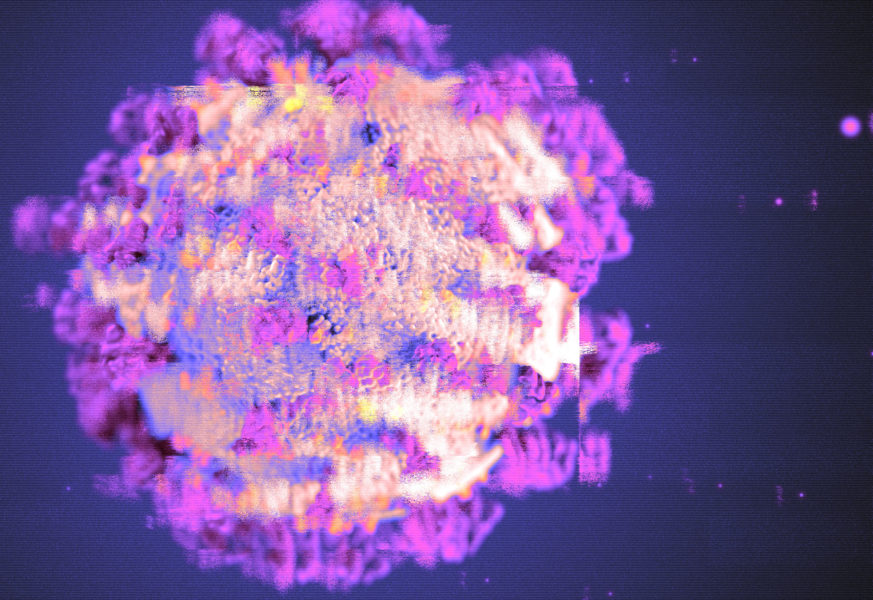The omicron variant of SARS-CoV-2 is much less likely to lead to long Covid than the variant circulating at the start of the COVID-19 pandemic, new research being presented at this year’s European Congress of Clinical Microbiology & Infectious Diseases (ECCMID 2023, Copenhagen, 15-18 April) suggests.
The Swiss study found that healthcare workers infected with the original wild-type virus were up to 67% more likely to report symptoms of long Covid than those who hadn’t had COVID-19.
However, healthcare workers whose first infection was with the omicron variant were no more likely to report long Covid symptoms than those who’d never had COVID-19.
The research also found that having omicron after a wild-type infection didn’t carry a greater risk of long Covid or fatigue than having a wild-type infection alone.
“Long Covid is a significant public health issue with prolonged, sometimes debilitating, illness, limited treatment options and uncertain outcome,” says Dr Carol Strahm, of the Division of Infectious Diseases and Hospital Epidemiology, Cantonal Hospital St Gallen, St Gallen, Switzerland, who will present the research.
“However, most of the data on it comes from individuals who contracted COVID-19 relatively early in the pandemic, before the emergence of the omicron variant towards the end of 2021.
“With the emergence of omicron, its ongoing global dominance and the accompanying explosion of infections, it is vital to find out more about who is at risk of long Covid and why.”
Dr Strahm assessed rates of long Covid symptoms in healthcare workers infected with the wild-type SARS-CoV-2 virus, the omicron variant (BA.1) or both and compared these to uninfected controls.
The prospective study involved 1,201 healthcare workers (81% female) with median age of 43 from nine Swiss healthcare networks.
The participants, who were recruited between June and September 2020, underwent regular testing for COVID-19 (nasopharyngeal swabs and antibody tests) and provided information on their vaccination status.
In March 2021 (Q1), September 2021 (Q2) and June 2022 (Q3) they completed online questionnaires which asked which, if any, of 18 long Covid symptoms they were experiencing. The most commonly reported symptoms included loss of sense of smell/ taste, tiredness/weakness, burnout/exhaustion and hair loss.
The questionnaire also covered fatigue levels. The median time of follow-up for wild-type infections was 18 months.
In Q1, the risk of long Covid symptoms was 67% higher in the 157 healthcare workers who’d had the wild-type infection (positive swab) than in the uninfected (no positive swab, seronegative) controls. In Q3, the risk of long Covid symptoms were 37% higher in the those who’d had the wild-type infection than in the controls.
A similar pattern was observed for fatigue. In Q1, the risk of fatigue was 45% higher in those who’d had the wild-type virus than in the controls but by Q3 the difference between the two groups was no longer significant.
However, the 429 healthcare workers whose first positive test for COVID-19 was for the omicron variant were no more likely to report long Covid symptoms than uninfected controls. Rates of fatigue were also similar between the groups.
Dr Strahm says: “We can only speculate as to why this was. It’s probably due to a combination of the omicron variant being less likely to cause severe illness than the wild-type virus – we know that long Covid is more common after severe illness – and immunity acquired through previous exposure to the virus through, for example, a sub-clinical infection without seroconversion.”
The analysis also revealed that reinfection – an omicron infection after a wild-type infection – didn’t carry a greater risk of long Covid or fatigue than a wild-type infection alone.
Similarly, vaccination did not affect the risk of long Covid or fatigue in those who had omicron after the wild-type virus.
Dr Strahm concludes: “While long Covid symptoms seemed to decline over time in healthcare workers who had a wild-type infection, they were still present after 18 months.
“In contrast, healthcare workers whose first positive test was for omicron did not develop significant long Covid symptoms.
“Neither omicron reinfections nor SARS-CoV-2 vaccination before omicron infection had any influence on long Covid.
He adds: “With omicron still dominant globally today, our results should provide reassurance to those who are contracting COVID-19 for the first time, as well as those who have already had the wild-type virus.
“It is, however, important to note that the participants in our study were mainly healthy, young, vaccinated women and the results might be different in a sicker, elderly and/or unvaccinated population.”
If our reporting has informed or inspired you, please consider making a donation. Every contribution, no matter the size, empowers us to continue delivering accurate, engaging, and trustworthy science and medical news. Independent journalism requires time, effort, and resources—your support ensures we can keep uncovering the stories that matter most to you.
Join us in making knowledge accessible and impactful. Thank you for standing with us!

